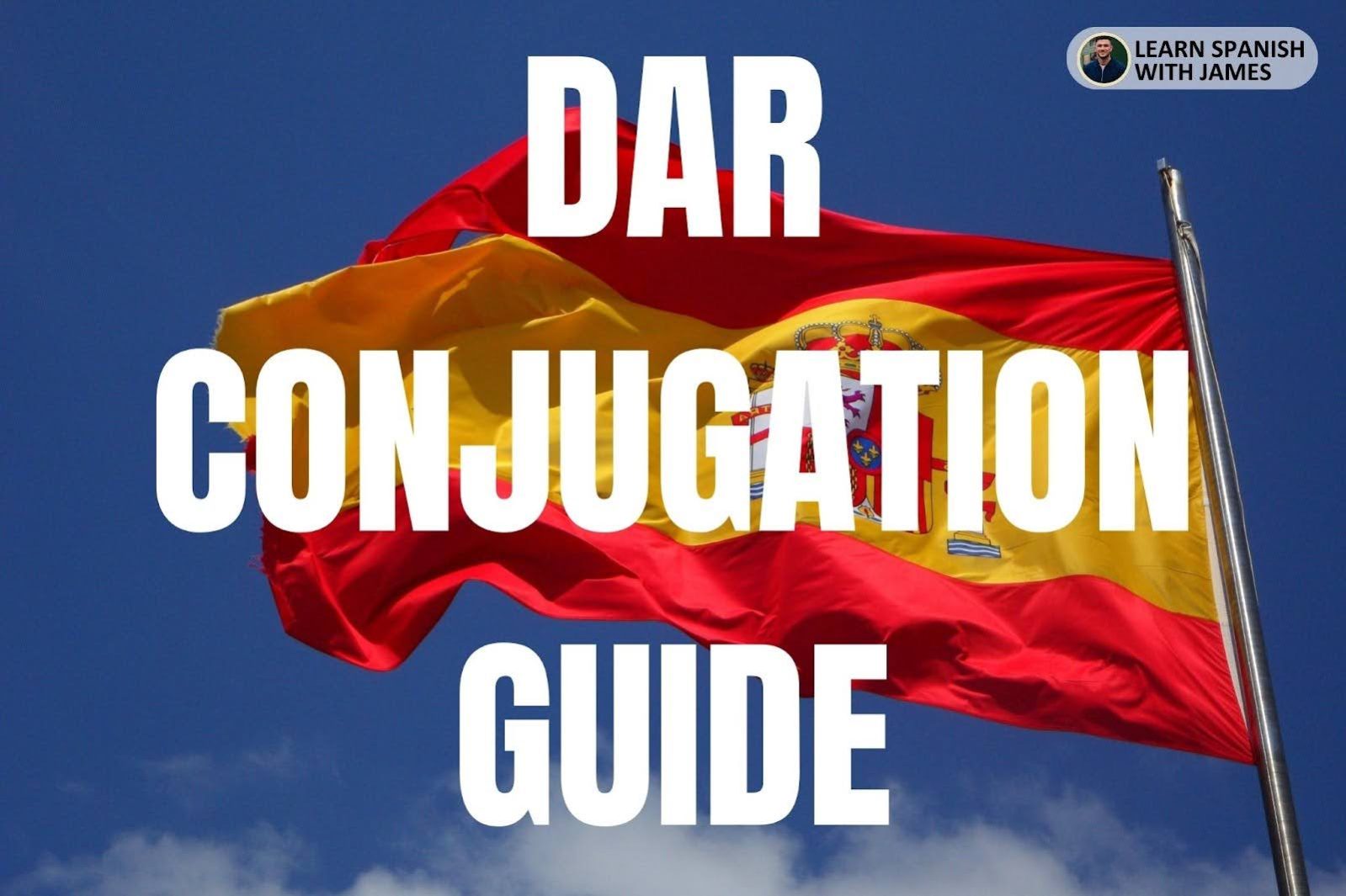Dar Conjugation Chart & Full Tense Guide

The Spanish verb “dar” (to give) is one of the most common verbs in the Spanish language, and it is often used in everyday communication.
The process of Spanish verb conjugation, especially when dealing with an irregular verb such as “dar”, may seem like a daunting task.
However, with this detailed analysis and clear explanations of the most common conjugations, learning how to conjugate ”dar” becomes manageable and rewarding.
I’m James, from Learn Spanish With James, and in this guide, I’ll show you the ”dar” conjugations for all Spanish tenses. This will help you to elevate your Spanish language skills to new heights and feel more confident when using irregular verbs.
Present Tense
Pronouns Pronombres
I yo doy
you tú das
he/she/it/you (formal) él, ella, usted da
we nosotros, nosotras damos
you (plural) vosotros, vosotras dais
they, you (pl. formal) ellos, ellas, ustedes dan
When We Use the Spanish Verb “Dar” in The Present Tense
The present tense of “dar” in Spanish in the indicative mood is used to express actions that are happening now, or habitual actions.
For example, the present tense ”dar” conjugation for the first person singular “Yo doy” means “I give” or “I am giving.” You have the full present tense conjugation chart above and the examples below.
This versatile Spanish verb can also be used to form a number of expressions, such as ”dar miedo” (to scare someone), ”dar las gracias” (to give thanks), ”me da igual” (I don’t mind), ”darse cuenta” (to realize), and more. You can find these in dictionaries with the infinitive ”dar” just as listed here.
Examples of the irregular verb “dar” in the Present Tense
- Yo doy un regalo a mi hermana. (I give a gift to my sister.)
- Tú das tu opinión en la reunión. (You give your opinion in the meeting.)
- Él da una conferencia en la universidad. (He gives a lecture at the university.)
- Ella da un paseo por el parque. (She takes a walk in the park.)
- Nosotros damos una fiesta en casa. (We throw a party at home.)
- Vosotros dais consejos a vuestros amigos. (You all give advice to your friends.) [Note: “Vosotros/as” is used in Spain for the informal plural “you.”]
- Ellos dan una vuelta por el centro de la ciudad. (They take a stroll around downtown.)
- Ustedes dan una buena impresión en la entrevista. (You give a good impression in the interview.)
Preterite Tense
Pronouns Pronombres
I yo di
you tú diste
he, she. it, you (formal) él, ella, usted dio
we nosotros, nosotras dimos
you (plural) vosotros, vosotras disteis
they, you (pl. formal) ellos, ellas, ustedes dieron
When We Use The Preterite Tense
The preterite tense of “dar” in Spanish is used to describe completed actions that happened at a specific point in the past, as well as events that occurred once, had a clear beginning and end, or were a sequence of completed actions.
For instance, the ”dar” conjugation in the first person “di” means “I gave” in English. Now, let’s look at examples of how such irregular verb forms are used for narrating a series of past events.
Examples of How to Conjugate “Dar” in the Preterite Tense
- Yo di el primer paso hacia la meta. (I took the first step towards the goal.)
- Tú diste un excelente consejo en ese momento. (You gave excellent advice at that moment.)
- Él dio un discurso inspirador en la conferencia. (He gave an inspiring speech at the conference.)
- Ella dio una gran presentación en la reunión. (She gave a great presentation at the meeting.)
- Nosotros dimos un regalo especial en su cumpleaños. (We gave a special gift on his birthday.)
- Vosotros disteis vuestro máximo esfuerzo en el partido. (You all gave your best effort in the game.)
- Ellos dieron una gran ayuda durante la emergencia. (They gave great help during the emergency.)
- Ustedes dieron una respuesta rápida a la solicitud. (You gave a quick response to the request.)
Imperfect Tense
Pronouns Pronombres
I yo daba
you tú dabas
he, she, it, you (formal) él, ella, usted daba
we nosotros, nosotras dábamos
you (plural) vosotros, vosotras dabais
they, you(pl. formal) ellos, ellas, ustedes daban
When We Use The Imperfect Tense
The imperfect tense of “dar” in Spanish is used to describe ongoing or repeated actions in the past, as well as to set the scene or provide background information. Spanish verbs in this tense portray actions that were ongoing, repeated, or in progress without a specific endpoint.
For example, “daba” means “I used to give” or “I was giving.” It’s often used to describe past situations, emotions, or characteristics, providing context or describing what was happening at a certain time in the past without emphasizing a specific beginning or end.
Examples of the “Dar” Conjugation in the Imperfect Tense
- Yo daba paseos por el parque todas las tardes. (I used to take walks in the park every afternoon.)
- Tú dabas excelentes consejos a tus amigos. (You used to give excellent advice to your friends.)
- Él daba clases de música los sábados por la mañana. (He used to teach music classes on Saturday mornings.)
- Ella daba dinero a organizaciones benéficas regularmente. (She used to give money to charitable organizations regularly.)
- Nosotros dábamos fiestas en casa cada fin de semana. (We used to throw parties at home every weekend.)
- Vosotros dabais vuestra opinión en las reuniones del club. (You all used to give your opinion in the club meetings.) [Note: “Vosotros/as” is used in Spain for the informal plural “you.”]
- Ellos daban regalos a sus padres en Navidad. (They used to give gifts to their parents at Christmas.)
- Ustedes daban paseos por el parque cuando eran jóvenes. (You used to take walks in the park when you were young.)
Future Tense
Pronouns Pronombres
I yo daré
you tú darás
he,she,it, you(formal) él,ella,usted dará
we nosotros,nosotras daremos
you pl. vosotros, vosotras daréis
they, you pl. (formal) ellos,ellas,ustedes darán
When We Use The Future Tense
The future tense of “dar” in Spanish is used to express actions or events that will happen in the future. It indicates forthcoming actions that have not occurred yet but are expected to occur. For example, the first person ”dar” conjugation “daré” means “I will give” or “I am going to give.”
This Spanish verb conjugation is commonly used to discuss plans, intentions, predictions, or expectations about future events when there’s certainty or confidence about what will happen.
Examples of the Future Tense
- Yo daré una conferencia sobre ese tema. (I will give a conference on that topic.)
- Tú darás un regalo sorpresa a tu amigo. (You will give a surprise gift to your friend.)
- Él dará su opinión en la reunión. (He will give his opinion in the meeting.)
- Ella dará una excelente presentación en el trabajo. (She will give an excellent presentation at work.)
- Nosotros daremos una fiesta de cumpleaños para celebrar. (We will throw a birthday party to celebrate.)
- Vosotros daréis vuestro apoyo a esa causa. (You all will give your support to that cause.) [Note: “Vosotros/as” is used in Spain for the informal plural “you.”]
- Ellos darán una donación a la organización benéfica. (They will give a donation to the charity organization.)
- Ustedes darán instrucciones claras a los empleados. (You will give clear instructions to the employees.)
Conditional Tense
Pronouns Pronombres
I yo daría
you tú darías
he,she,it, you(formal) él,ella,usted daría
we nosotros,nosotras daríamos
you pl. vosotros, vosotras daríais
they, you pl. (formal) ellos,ellas,ustedes darían
When We Use The Conditional
The conditional tense of “dar” in Spanish is used to express actions or events that would happen under certain conditions or circumstances. It implies hypothetical situations, desires, or polite requests.
For example, the first person ”dar” conjugation “daría” means “I would give” or “I would be giving.”
This tense is often used to convey polite requests, express hypothetical outcomes, or talk about what one would do in certain situations. Let’s now look at examples of how to conjugate ”dar” in context for the conditional.
Examples of the Conditional Tense
- Yo daría mi apoyo si me necesitaras. (I would give my support if you needed me.)
- Tú me darías una mano si te lo pidiera. (You would give me a hand if I asked for it.)
- Él le daría una oportunidad si ella se disculpara. (He would give her a chance if she apologized.)
- Ella nos daría su opinión si le preguntáramos. (She would give us her opinion if we asked her.)
- Nosotros les daríamos las gracias si nos ayudaran. (We would give them thanks if they helped us.)
- Vosotros les daríais vuestro tiempo si lo valoraran más. (You all would give them your time if they valued it more.) [Note: “Vosotros/as” is used in Spain for the informal plural “you.”]
- Ellos les darían su amistad si fueran más amables. (They would give them their friendship if they were kinder.)
- Ustedes nos darían su confianza si demostráramos ser dignos de ella. (You would give us your trust us if we proved to be worthy of it.)
Preterite Perfect Tense
Pronouns Pronombres Auxiliary verb ‘haber’
I yo he dado
you tú has dado
he,she,it, you(formal) él,ella,usted ha dado
we nosotros,nosotras hemos dado
you pl. vosotros, vosotras habéis dado
they, you pl. (formal) ellos,ellas,ustedes han dado
When We Use The Preterite Perfect Tense
The preterite perfect tense of “dar” in Spanish, formed with the auxiliary verb “haber” and the past participle “dado,” is used to express actions that were completed in the recent past or actions that have relevance to the present moment.
For example, the first person ”dar” conjugation “he dado” means “I have given.”
This tense is like the present perfect and emphasizes the result or outcome of the action, often in contrast to ongoing or habitual actions expressed in the imperfect tense.
Examples of the Preterite Perfect
- Yo he dado el regalo a mi madre. (I have given the gift to my mother.)
- Tú has dado tu opinión sobre el tema. (You have given your opinion on the matter.)
- Ella ha dado una conferencia muy interesante. (She has given a very interesting lecture.)
- Nosotros hemos dado nuestro apoyo incondicional. (We have given our unconditional support.)
- Vosotros habéis dado vuestra palabra. (You all have given your word.)
- Ellas han dado mucha ayuda a la comunidad. (They have given a lot of help to the community.) /
- Ustedes hubieron dado instrucciones claras antes de la llegada del equipo de trabajo. (You had given clear instructions before the arrival of the work team.)
Pluperfect Tense
Pronouns Pronombres Auxiliary verb ‘haber’
I yo había dado
you tú habías dado
he,she,it, you(formal) él,ella,usted había dado
we nosotros,nosotras habíamos dado
you pl. vosotros, vosotras habíais dado
they, you pl. (formal) ellos,ellas,ustedes habían dado
When We Use The Pluperfect Tense
The pluperfect tense in Spanish for the verb “dar” (to give) is used to express actions that had been completed before a certain point in the past. It emphasizes the completion of an action before another past event.
For example, “había dado” (had given) might be used to describe something that had been given prior to a specific time or event.
Examples of the Pluperfect
- Yo había dado mi palabra antes de cambiar de opinión. (I had given my word before changing my mind.)
- Tú habías dado un gran consejo que me ayudó mucho. (You had given great advice that helped me a lot.)
- Él había dado una conferencia sobre el tema antes de la publicación del libro. (He had given a lecture on the topic before the publication of the book.)
- Ella había dado su consentimiento antes de que comenzara el proyecto. (She had given her consent before the project started.)
- Nosotros habíamos dado nuestro máximo esfuerzo antes de la derrota. (We had given our best effort before the defeat.)
- Vosotros habíais dado una excelente presentación antes del descanso. (You all had given an excellent presentation before the break.) [Note: “Vosotros/as” is used in Spain for the informal plural “you.”]
- Ellos habían dado muestras de apoyo antes de la crisis. (They had given signs of support before the crisis.)
- Ustedes habían dado instrucciones claras antes de la llegada del equipo de trabajo. (You had given clear instructions before the arrival of the work team.)
Future Perfect Tense
Pronouns Pronombres Auxiliary verb ‘haber’
I yo habré dado
you tú habrás dado
he,she,it, you(formal) él,ella,usted habrá dado
we nosotros,nosotras habremos dado
you pl. vosotros, vosotras habréis dado
they, you pl. (formal) ellos,ellas,ustedes habrán dado
When We Use The Future Perfect Tense
The future perfect tense of “dar” in Spanish, formed with the auxiliary verb “haber” and the past participle “dado,” is used to express actions that will have been completed by a certain point in the future. For example, the first person ”dar” conjugation “habré dado” means “I will have given.”
It is used to talk about actions that will be finished or accomplished before another future event or by a specific time in the future.
This tense allows speakers to describe the completion of an action in relation to a future point, emphasizing the result or outcome of the action.
Examples of the Future Perfect
- Yo habré dado clases durante veinte años al finalizar este curso. (I will have been teaching for twenty years by the end of this course.)
- Tú habrás dado tu respuesta para el mediodía. (You will have given your answer by noon.)
- Él habrá dado su discurso antes de que termine el evento. (He will have given his speech before the event ends.)
- Ella habrá dado su consentimiento antes de que lleguemos a una decisión final. (She will have given her consent before we reach a final decision.)
- Nosotros habremos dado la bienvenida a los invitados cuando lleguen. (We will have welcomed the guests when they arrive.)
- Vosotros habréis dado vuestras sugerencias antes de la fecha límite. (You all will have given your suggestions before the deadline.) [Note: “Vosotros/as” is used in Spain for the informal plural “you.”]
- Ellos habrán dado su apoyo a la causa antes de la manifestación. (They will have given their support to the cause before the demonstration.)
- Ustedes habrán dado las indicaciones necesarias antes de que iniciemos el proyecto. (You will have given the necessary instructions before we start the project.)
Conditional Perfect Tense
Pronouns Pronombres Auxiliary verb ‘haber’
I yo habría dado
you tú habrías dado
he,she,it, you(formal) él,ella,usted habría dado
we nosotros,nosotras habríamos dado
you pl. vosotros, vosotras habríais dado
they, you pl. (formal) ellos,ellas,ustedes habrían dado
When We Use The Conditional Perfect Tense
The conditional perfect tense of “dar” in Spanish, formed with the auxiliary verb “haber” and the past participle “dado,” is used to express actions that would have occurred under certain conditions in the past.
For example, the first person ”dar” conjugation “habría dado” means “I would have given.”
It’s employed to discuss hypothetical or unreal situations, expressing what someone would have done if circumstances had been different.
Examples of the Conditional Perfect
- Yo habría dado más si hubiera tenido la oportunidad. (I would have given more if I had had the opportunity.)
- Tú habrías dado un excelente discurso si te hubieras preparado mejor. (You would have given an excellent speech if you had prepared better.)
- Él habría dado su apoyo si hubiera estado enterado de la situación. (He would have given his support if he had been aware of the situation.)
- Ella habría dado su consentimiento si hubiera entendido los beneficios. (She would have given her consent if she had understood the benefits.)
- Nosotros habríamos dado una respuesta más rápida si hubiéramos recibido la información a tiempo. (We would have given a quicker response if we had received the information on time.)
- Vosotros habríais dado una mejor impresión si hubierais llegado puntualmente. (You all would have given a better impression if you had arrived on time.)
- Ellos habrían dado su aprobación si hubieran sido consultados previamente. (They would have given their approval if they had been consulted beforehand.)
- Ustedes habrían dado su contribución si hubieran sido invitados al proyecto. (You would have given your contribution if you had been invited to the project.)
Present Subjunctive
Pronouns Pronombres
I yo dé
you tú des
he,she,it, you(formal) él,ella,usted dé
we nosotros,nosotras demos
you pl. vosotros, vosotras deis
they, you pl. (formal) ellos,ellas,ustedes den
When We Use The Present Subjunctive
The present subjunctive tense of “dar” in Spanish is used to express wishes, desires, recommendations, doubts, or uncertainty regarding actions or events in the present or future.
The conjugated verb in the subjunctive mood is often used in dependent clauses following certain expressions, such as wishes, requests, or recommendations, where there’s a sense of uncertainty or subjectivity.
For example, “espero que des” means “I hope you give.”
Examples of the Present Subjunctive
- Es importante que yo dé lo mejor de mí en este proyecto. (It’s important that I give my best in this project.)
- Quiero que tú des una explicación sobre lo sucedido. (I want you to give an explanation about what happened.)
- Es necesario que él dé su consentimiento antes de proceder. (It’s necessary that he gives his consent before proceeding.)
- Espero que ella dé su opinión en la próxima reunión. (I hope that she gives her opinion at the next meeting.)
- Deseamos que nosotros demos una buena impresión en la entrevista. (We wish that we give a good impression in the interview.)
- Prefiero que vosotros deis vuestra opinión sobre el asunto. (I prefer that you all give your opinion on the matter.)
- Es bueno que ellos den un paso adelante para resolver el problema. (It’s good that they take a step forward to solve the problem.)
- Quiero que ustedes den su aprobación antes de finalizar el acuerdo. (I want you to give your approval before finalizing the agreement.)
Imperfect Subjunctive
Pronouns Pronombres
I yo diera,diese
you tú dieras,dieses
he,she,it, you(formal) él,ella,usted diera,diese
we nosotros,nosotras diéramos,diésemos
you pl. vosotros, vosotras dierais,dieseis
they, you pl. (formal) ellos,ellas,ustedes dieran,diesen
When We Use The Imperfect Subjunctive
The imperfect subjunctive tense of “dar” in Spanish is used to express hypothetical or uncertain actions, desires, or wishes in the past.
It’s often employed in dependent clauses following expressions of emotion, doubt, or uncertainty in the main clause. For instance, “Si él me diera un abrazo, me sentiría mejor” translates to “If he gave me a hug, I would feel better.”
This tense allows speakers to convey past situations that didn’t happen or were uncertain, expressing wishes, desires, or hypothetical scenarios regarding past actions.
Examples of the Imperfect Subjunctive
- Quería que yo diera más explicaciones sobre el tema. (I wanted me to give more explanations about the topic.)
- Te sugerí que tú dieras tu opinión en la reunión. (I suggested you give your opinion at the meeting.)
- Era importante que él diera el ejemplo a seguir. (It was important that he set the example to follow.)
- Deseaba que ella diera su apoyo a la causa. (I wished she would give her support to the cause.)
- Pedíamos que nosotros diéramos la bienvenida a todo el mundo en el evento. (We asked that we welcome everyone at the event.)
- Preferías que vosotros dierais vuestra contribución al proyecto. (You preferred that you all give your contribution to the project.)
- Querían que ellos dieran una explicación sobre lo sucedido. (They wanted them to give an explanation about what happened.)
- Era necesario que ustedes dieran su consentimiento antes de avanzar. (It was necessary that you all give your consent before moving forward.)
Preterite Perfect Subjunctive
Pronouns Pronombres Auxiliary verb ‘haber’
I yo hubiera,hubiese dado
you tú hubieras,hubieses dado
he,she,it, you(formal) él,ella,usted hubiera,hubiese dado
we nosotros,nosotras hubiéramos,hubiésemos dado
you pl. vosotros, vosotras hubierais,hubieseis dado
they, you pl. (formal) ellos,ellas,ustedes hubieran,hubiesen dado
When We Use The Preterite Perfect Subjunctive
The preterite perfect subjunctive tense of “dar” in Spanish is used to express actions or events that would have occurred before another past action or event, often in hypothetical or unreal situations.
This tense allows speakers to express hypothetical past actions or outcomes, emphasizing their relationship to other past events or conditions and indicating what could have been if circumstances had been different.
Examples of the Preterite Perfect Subjunctive
- Yo esperaba que tú hubieras dado tu opinión durante la reunión. (I hoped that you had given your opinion during the meeting.)
- Tú deseabas que él hubiera dado más detalles sobre el proyecto. (You wished that he had given more details about the project.)
- Él prefería que nosotros hubiéramos dado una respuesta más rápida. (He preferred that we had given a quicker response.)
- Nosotros pedíamos que vosotros hubierais dado vuestro apoyo a la causa. (We were asking that you (all) had given your support to the cause.)
- Vosotros queríais que ellos hubieran dado una explicación sobre lo ocurrido. (You all wanted them to have given an explanation about what happened.)
- Ellos sugerían que ustedes hubieran dado su consentimiento antes de avanzar. (They suggested that you (formal) had given your consent before moving forward.)
- Ellas insistían en que yo hubiera dado una explicación más clara. (They insisted that I had given a clearer explanation.)
- Ustedes deseaban que nosotros hubiéramos dado más tiempo para considerar todas las opciones. (You (plural) wished that we had given more time to consider all the options.)
Affirmative Imperative
Pronouns Pronombres
you tú ¡da!
he,she,it, you(formal) él,ella,usted ¡dé!
we nosotros,nosotras ¡demos!
you pl. vosotros, vosotras ¡dad!
they, you pl. (formal) ellos,ellas,ustedes ¡den!
When We Use The Affirmative Imperative
The affirmative imperative for the irregular verb “dar” in Spanish is used to command or urge someone to give something.
For example, “Da el libro” (Give the book). Such ”dar” conjugations are used in situations where direct instruction or request is needed, often in a polite or authoritative tone.
Examples of Dar in the Affirmative Imperative
- Da más detalles para que sea más comprensible. (Give more details to make it more understandable.)
- Da tu opinión ahora mismo. (Give your opinion right now.)
- Dame una oportunidad para solucionar las cosas. (Give me a chance to work things out.)
Negative Imperative
Pronouns Pronombres
you tú ¡no des!
he,she,it, you(formal) él,ella,usted ¡no dé!
we nosotros,nosotras ¡no demos!
you pl. vosotros, vosotras ¡no deis!
they, you pl. (formal) ellos,ellas,ustedes ¡no den!
When We Use The Negative Imperative
The negative imperative mood for the irregular verb “dar” (to give) in Spanish is used to prohibit or advise against giving something. Spanish verbs follow the negative particle “no” here. For instance, “No des el libro” (Don’t give the book).
Now, let’s look at examples of how such irregular verb forms are used to express a command to refrain from an action.
Examples of Dar in the Negative Imperative
- No des más detalles si no son necesarios. (Don’t give more details if they’re not necessary.)
- No me des más excusas, necesito resultados. (Don’t give me more excuses, I need results.)
- No deis más atención a los detalles si no es necesario. (Don’t pay more attention to the details if it’s not necessary.)
- No den más apoyo si no están comprometidos con el objetivo. (Don’t give more support if you’re not committed to the goal.)
Online Spanish Courses & Grammar Courses
For a full list of Beginner, Intermediate and Advanced Courses, check out this full list of online Spanish courses.
I put this list together myself, and it comprises a mixture of courses that offer Spanish grammar practice for all levels, conversational practice, listening and writing exercises in Spanish, free Spanish courses, and a whole lot more.
The fastest way to learn Spanish is to test a mixture of Spanish resources and choose the course that coincides most with your learning style.
In addition to online Spanish courses, on this site you will find a wide range of Spanish podcasts, Spanish apps, Spanish YouTube channels, and both online and physical Spanish language schools.

About James – Or Should that be Santiago?
My name is James. I am a Brit with a love for the Spanish language. I have lived in Spain, Argentina, and Costa Rica, and I have been teaching Spanish for over a decade. This site will show you how to master the elements of Spanish grammar that often dishearten learners. I hope you enjoy the site and find it useful.
If you are interested in taking your Spanish to the next level, check out the Courses section for a full list of the Spanish courses I suggest. All reviews are based on my personal opinions.





